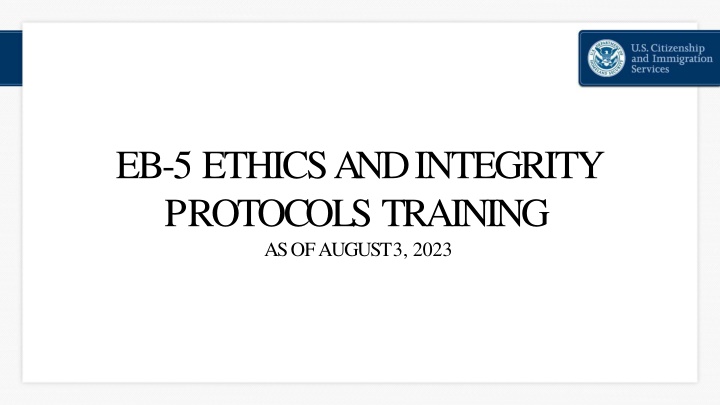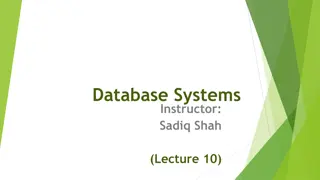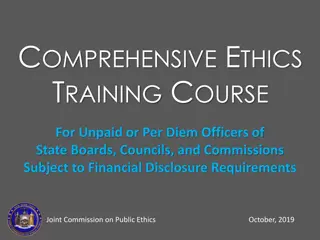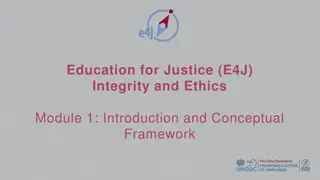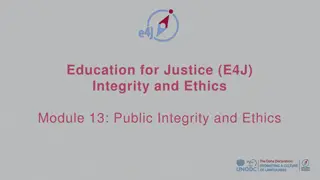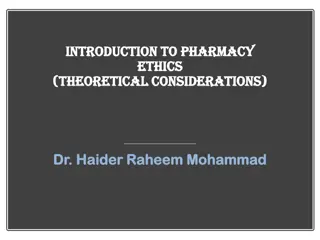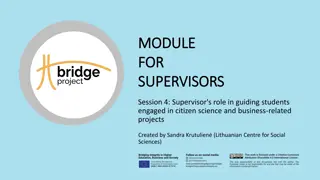EB-5 Ethics and Integrity Protocols Training Overview
This overview provides information on the EB-5 program, Ethics and Integrity Protocols, training objectives, background information, and the EB-5 Reform and Integrity Act of 2022. It covers the purpose, guidelines, and implementation plan of the protocols to ensure transparency and accountability in administering the EB-5 program. The Act emphasizes impartiality, communication standards, and employee conduct regarding the EB-5 program.
Download Presentation

Please find below an Image/Link to download the presentation.
The content on the website is provided AS IS for your information and personal use only. It may not be sold, licensed, or shared on other websites without obtaining consent from the author.If you encounter any issues during the download, it is possible that the publisher has removed the file from their server.
You are allowed to download the files provided on this website for personal or commercial use, subject to the condition that they are used lawfully. All files are the property of their respective owners.
The content on the website is provided AS IS for your information and personal use only. It may not be sold, licensed, or shared on other websites without obtaining consent from the author.
E N D
Presentation Transcript
EB-5 ETHICS AND INTEGRITY PROTOCOLS TRAINING AS OF AUGUST 3, 2023
DISCLAIMER This training module is intended solely for informational purposes. It is not intended to, does not, and may not be relied upon to create or confer any right(s) or benefit(s), substantive or procedural, enforceable at law by any individual or other party in benefit applications before USCIS, in removal proceedings, in litigation with the United States, or in any other form or manner. This training module does not have the force of law, or of a DHS directive. 2
TRAINING OBJECTIVES You will be able to: Describe the EB-5 program. Identify the EB-5 Ethics and Integrity Protocols. Recognize to whom the protocols apply. Identify the guiding principles for EB-5 processing. Demonstrate how to handle contacts from stakeholders regarding specific EB-5 cases. Identify when and how senior leadership may intervene in specific EB-5 cases. Report suspected violation(s) of the protocols. 3
BACKGROUND Congress created the EB-5 program in 1990 to stimulate the U.S. economy through job creation and capital investment by immigrant investors. March 24, 2015 The Office of the Inspector General (OIG) issues report: Investigation into Employee Complaints about Management of USCIS EB-5 Program. On April 30, 2015, the Secretary of Homeland Security issued Ethics and Integrity: Protocols for Processing of EB-5 Immigrant Investor Visa Petitions and EB-5 Regional Center Applications, Including Stakeholder Communications. 4
BACKGROUND As directed, USCIS established the protocols to ensure that the EB-5 program is administered with integrity and that substantive correspondence and discussions between external interested parties and DHS personnel are tracked and documented for transparency and accountability. May 11, 2015 USCIS developed EB-5 Ethics and Integrity Protocols Implementation Plan. The implementation plan recognized that, while the protocols were effective immediately, USCIS was prepared to clarify and refine the protocols as needed. 5
BACKGROUND EB-5 Reform and Integrity Act of 2022 March 15, 2022 - President Biden signed the EB-5 Reform and Integrity Act of 2022. Sec. 107 of this act governs the conduct of DHS employees and communications related to the EB-5 program. Among other things, the act requires that all DHS employees act impartially and not give preferential treatment in connection with any aspect of the EB-5 Program. In addition, the act places limits on the appropriate channels of communication and requires certain communications be recorded or detailed minutes be taken and included in the record of proceeding. Though generally similar in many respects, these statutory provisions supersede the protocols where there is any conflict. 6
EB-5 PROTOCOLS APPLICATION The protocols apply to all DHS and USCIS employees and contractors including the Secretary of Homeland Security, the Secretary's counselors, the Assistant Secretary for the Private Sector, the Director of U.S. Citizenship and Immigration Services, counselors to such Director, and the Chief of the Immigrant Investor Program Office. 7
GUIDING PRINCIPLES FOR EB-5 PROCESSING Compliance with Existing Ethics Rules All official actions relating to any EB-5 petition, application, policy or procedure: Must be taken by employees or contractors free of financial or other conflicts of interest. Must avoid endorsement of any non-federal entity, person or project. Transparency All EB-5 petitions and applications must be adjudicated in a manner that ensures transparency and impartiality. 8
GUIDING PRINCIPLES FOR EB-5 PROCESSING Consistency EB-5 petitions, applications and appeals should be adjudicated based on reasonable application of laws, regulations, and policies. Appearances Employees and contractors must act impartially and avoid even the appearance of impropriety in order to ensure the integrity of our nation s immigration laws. DHS employees or contractors could potentially violate the prohibition against preferential treatment or create an appearance of the same in a number of ways. 9
GUIDING PRINCIPLES FOR EB-5 PROCESSING Appearances examples: Working on, or in any way attempting to influence, in a manner not available to or accorded to all other petitioners, applicants, and seekers of benefits under the immigrant visa program . . ., the standard processing of an application, petition, or benefit; Working on or attempting to expedite or otherwise influence the processing of an immigration application, petition or benefit for a friend, relative, neighbor or acquaintance; Meeting with certain stakeholders to the exclusion of others who are similarly situated; 10
GUIDING PRINCIPLES FOR EB-5 PROCESSING Appearances examples: Referring applicants to a particular immigration practitioner or vendor; or Using an official position or title in a manner that could reasonably be construed to imply that the federal government sanctions or endorses the individual s personal activities or those of someone else. 11
PROCEDURES FOR STAKEHOLDER CONTACTS REGARDING SPECIFIC PETITIONS OR APPLICATIONS Stakeholders for the purpose of the EB-5 Protocols include, but are not limited to: Petitioners Applicants Entities seeking benefits under the EB-5 program, including regional centers, new commercial enterprises (NCEs) and job-creating entities (JCEs), or any person or entity associated with these entities Members of Congress and Congressional Staff State and Local Officials Industry Leaders and Civic Groups Non-Profit Entities and Business-Oriented Interest Groups 12
PROCEDURES FOR STAKEHOLDER CONTACTS REGARDING SPECIFIC PETITIONS OR APPLICATIONS Procedural vs. Substantive Communications Communication with EB-5 Petitioners, Applicants and Other Stakeholders Communications with Members of Congress and Congressional Staffers Communications with Other Elected Officials Communications with White House Staff 13
PROCEDURES FOR STAKEHOLDER CONTACTS REGARDING SPECIFIC PETITIONS OR APPLICATIONS Procedural Substantive The EB-5 Protocols do not change any procedures, policies or protocols currently in place in USCIS or DHS for routine questions asked by EB-5 stakeholders involving "procedural" matters in EB-5 cases. The EB-5 Protocols require memorialization and filing in the relevant EB-5 case file when otherwise not required as a matter of USCIS policy. 14
PROCEDURES FOR STAKEHOLDER CONTACTS REGARDING SPECIFIC PETITIONS OR APPLICATIONS Procedural Communications Procedural communications should be documented consistent with the procedures established by the EB-5 Protocols for the USCIS Contact Center intake process. Procedural matters include, but are not limited to: o The manner or method of filing, or o Providing general information on the processing, appealing or fast- tracking (expediting) of an individual EB-5 case or groups of similar EB-5 cases. 15
PROCEDURES FOR STAKEHOLDER CONTACTS REGARDING SPECIFIC PETITIONS OR APPLICATIONS Procedural Communications Below are ways stakeholders can contact USCIS about EB-5 cases: o USCIS.ImmigrantInvestorProgram@uscis.dhs.gov o call the USCIS Contact Center at 1-800-375-5283 or TDD 1-800-767-1833 o email the USCIS Office of Public Engagement o Office of the Citizenship and Immigration Services Ombudsman 16
PROCEDURES FOR STAKEHOLDER CONTACTS REGARDING SPECIFIC PETITIONS OR APPLICATIONS Substantive Communications Under the EB-5 Protocols, substantive communications require memorialization and filing in the EB-5 case file. Substantive communications are interactions in which there is a discussion of facts specific to an EB-5 case. In particular, substantive communications will also involve application of DHS and USCIS policy to these facts or to the processing of EB-5 petitions or applications, with a view toward impacting the facts considered and the adjudication of the case. 17
PROCEDURES FOR STAKEHOLDER CONTACTS REGARDING SPECIFIC PETITIONS OR APPLICATIONS Substantive Communications (cont.) The determination of whether a communication is substantive must be made with regard to whether such communication has the likelihood of impacting or was considered in the adjudication of an EB-5 application or petition. 18
PROCEDURES FOR STAKEHOLDER CONTACTS REGARDING SPECIFIC PETITIONS OR APPLICATIONS Substantive Communications (cont.) These "substantive" communications may also include conversations with a stakeholder that include directing or pressuring the senior official to become involved in any aspect of the processing of a particular EB-5 case or that actually leads to the senior official's involvement in such case processing. 19
PROCEDURES FOR STAKEHOLDER CONTACTS REGARDING SPECIFIC PETITIONS OR APPLICATIONS Substantive Communications (cont.) Examples of substantive communications include, but are not limited to, communications relating to: o Any mandamus case or other litigation; o Advocacy letters from Congress, congressional staff and state or local elected officials; o Any communication from the USCIS Director s Office. 20
PROCEDURES FOR STAKEHOLDER CONTACTS REGARDING SPECIFIC PETITIONS OR APPLICATIONS Substantive Communications (cont.) o Any submission or offering of facts for consideration in the adjudication; o Any case that requires supervisory intervention or processing outside of the normal processing flow (such as a request to expedite adjudication of an application or petition); and o Any USCIS Requests for Clarification. 21
PROCEDURES FOR STAKEHOLDER CONTACTS REGARDING SPECIFIC PETITIONS OR APPLICATIONS Substantive Communications (cont.) o If you or a staff member receive an EB-5 inquiry from stakeholders, petitioners, applicants, or entities seeking benefits under the immigrant visa program who may be advocating for an action on a specific case, a legal interpretation, or a policy change, please forward the inquiry to uscis.immigrantinvestorprogram@uscis.dhs.gov. o Do not use this email to send routine questions that USCIS contact centers receive about the status of cases, unless the inquiry advocates for an action on a specific case, a legal interpretation, or a policy change. 22
PROCEDURES FOR STAKEHOLDER CONTACTS REGARDING SPECIFIC PETITIONS OR APPLICATIONS To view examples of procedural and substantive communications, see appendix. 23
PROCEDURES FOR STAKEHOLDER CONTACTS REGARDING SPECIFIC PETITIONS OR APPLICATIONS Contacts with EB-5 Petitioners, Applicants and Other Stakeholders Contacts from stakeholders should come through the USCIS Contact Center intake process previously mentioned or through established policies of the relevant office (e.g., USCIS Immigrant Investor Program Office, Office of the Citizenship and Immigration Services Ombudsman) so that the contacts can be tracked and documented. 24
PROCEDURES FOR STAKEHOLDER CONTACTS REGARDING SPECIFIC PETITIONS OR APPLICATIONS Contacts with EB-5 Petitioners, Applicants and Other Stakeholders Any substantive telephonic communication, virtual communication, in-person meetings, or non-written communications must be documented (for example, transcribed into a written statement), printed, and placed in the relevant case file. 25
PROCEDURES FOR STAKEHOLDER CONTACTS REGARDING SPECIFIC PETITIONS OR APPLICATIONS Contacts with members of Congress and congressional staff Substantive written contacts and questions must be processed according to established Office of Legislative and Intergovernmental Affairs procedures. Congressional advocacy letters (e.g., letter of support, targeted employment area letter) will be deemed substantive and must be placed in the relevant case file. 26
PROCEDURES FOR STAKEHOLDER CONTACTS REGARDING SPECIFIC PETITIONS OR APPLICATIONS Contacts with members of Congress and congressional staff Non-substantive communications must be tracked according to Office of Legislative and Intergovernmental Affairs procedures. Oral communications from Congress or staff should be referred to the Office of Legislative and Intergovernmental Affairs. 27
PROCEDURES FOR STAKEHOLDER CONTACTS REGARDING SPECIFIC PETITIONS OR APPLICATIONS Communications with Other Elected Officials Governors, mayors, and other state and local leaders may have concerns similar to members of Congress. Contacts with their offices and staffs should be treated consistent with the procedures identified for contacts with members of Congress and congressional staff. 28
PROCEDURES FOR STAKEHOLDER CONTACTS REGARDING SPECIFIC PETITIONS OR APPLICATIONS Communications with White House Staff The DHS directive on communications with the White House applies to EB-5 adjudications. See Communications with the White House Regarding Open Investigations, Adjudications, or Civil and Criminal Enforcement Actions, MD 0430 (March 1, 2003). 29
INFORMATION REQUESTS BY THE WHITE HOUSE If you receive a request about an EB-5 petition or application that originates from the White House, assess whether it involves an open DHS investigation, adjudication, or civil or criminal enforcement action. o If yes, do not respond and immediately consult with the USCIS Office of Chief Counsel or with the DHS Office of General Counsel. 30
INFORMATION REQUESTS BY THE WHITE HOUSE Per the management directive, initial communications between the White House and DHS regarding any pending Department investigation, adjudication, or criminal or civil enforcement action must go between the White House Counsel and the DHS General Counsel or Deputy General Counsel. Requests that are not referred through DHS Office of General Counsel may require redirection for evaluation. 31
INFORMATION REQUESTS BY THE WHITE HOUSE All White House requests for information do not fall under the purview of the White House management directive. For example, requests for statistics, policy information, etc. would not qualify. Forward requests from the White House that do not concern open Department investigations, adjudications, or civil or criminal enforcement actions to the USCIS Contact Center, Office of Access and Information Services (OAIS). 32
INFORMATION REQUESTS BY THE WHITE HOUSE OAIS receives and responds to all other White House inquiries that have immigration questions specific to the receipt of benefits. When OAIS receives an EB-5 related inquiry, they will reach out to the relevant program office for assistance to respond. The program office (e.g., the Immigrant Investor Program Office) should determine if the information request relates to an open adjudication, investigation, civil or criminal enforcement court action. If it does, the program office should immediately consult with USCIS Office of Chief Counsel or with the DHS Office of General Counsel. 33
INFORMATION REQUESTS BY THE WHITE HOUSE If the program office determines that the information requested does not relate to an open adjudication, investigation, civil or criminal enforcement court action (does not fall under the purview of the White House management directive), the program office should provide OAIS with the information needed for OAIS to respond to the inquiry. 34
LEADERSHIP INTERVENTION IN SPECIFIC EB-5 ADJUDICATIONS Protocols Focus 35
LEADERSHIP INTERVENTION IN SPECIFIC EB-5 ADJUDICATIONS Senior leaders may intervene in particular cases only under exceptional circumstances. Intervention means providing substantive direction or input on decision-making or appeals regarding particular EB-5 cases, including requests to expedite. Intervention does not include mere requests for information (e.g., request for case status). 36
LEADERSHIP INTERVENTION IN SPECIFIC EB-5 ADJUDICATIONS Examples include, but are not limited to, situations where the case: 1. May affect national security; 2. May hinder a governmental response to an emergency matter, where serious economic injury or actual physical injury could occur; 3. May result in a serious failure to meet DHS s mission; or 4. Involves allegations of misconduct by government employees and contractors (e.g., a conflict of interest), raising questions about the integrity of the adjudication process. 37
LEADERSHIP INTERVENTION IN SPECIFIC EB-5 ADJUDICATIONS In such cases, if senior DHS leadership deems that circumstances exist that require leadership intervention in a particular case, they must, in writing, memorialize the decision. This written memorialization must articulate how leadership became aware of the facts of the case, and the impartial mission-related reason for intervention. 38
LEADERSHIP INTERVENTION IN SPECIFIC EB-5 ADJUDICATIONS In the event the Secretary or Deputy Secretary of Homeland Security considers personal intervention in a particular case, prior consultation with the General Counsel is required. 39
LEADERSHIP INTERVENTION IN SPECIFIC EB-5 ADJUDICATIONS For all other officials, the written memorialization must be provided to the senior officials designated below for the purpose of providing the Director (or the Director's delegate) written recommendations regarding an extraordinary intervention in a particular case: 1. The Deputy Director 2. The USCIS Chief Counsel 3. The CIS Ombudsman or delegate 4. Any other official the Director designates 40
LEADERSHIP INTERVENTION IN SPECIFIC EB-5 ADJUDICATIONS Upon receiving recommendations from these designated senior officials, if the Director, or the Director's delegate, decides that an extraordinary case intervention is appropriate, he or she must document that decision and the reasons for intervention in writing. 41
EXPEDITED REQUESTS The USCIS general policy governing expedited processing of applications and petitions applies to all requests to expedite processing of EB-5 petitions or applications. You can find the expedite criteria at http://www.uscis.gov/forms/expedite-criteria. 42
EB-5 Reform and Integrity Act of 2022 Sec. 107 of the EB-5 Reform and Integrity Act of 2022 generally integrates many of the same concepts and principles as the 2015 EB-5 Ethics and Integrity Protocols. In the event there is any conflict between the statutory provisions and the Protocols, the statutory provisions will control. If you have any questions regarding interpretation of the statutory provisions with respect to implementation of the EB-5 Ethics and Integrity Protocols, contact IPO or USCIS OCC. 43
EB-5 Reform and Integrity Act of 2022 Sec. 107(a) of the EB-5 Reform and Integrity Act of 2022 requires that all DHS employees act impartially and not give preferential treatment to any entity, organization, or individual in connection with any aspect of the EB-5 program. Sec. 107(b) of the EB-5 Reform and Integrity Act of 2022 specifically includes certain activities that constitute preferential treatment: Working on, or in any way attempting to influence, the standard processing of an EB-5 application, petition or benefit in a manner not available to or accorded to all others. Meeting or communicating with persons associated with an EB-5 entity at their request in a manner not available to all others. 44
EB-5 Reform and Integrity Act of 2022 Sec. 107(c) of the EB-5 Reform and Integrity Act of 2022 requires that all case-specific written communication and substantive oral communication (recorded or detailed minutes) with non-DHS personnel be included in the record of proceeding. Case-specific evidence from anyone other than an affected party or their representative may not be considered or made part of the record unless the affected party has been given notice and an opportunity to respond. Certain communications and evidence are excepted, such as routine communications with Federal agencies as well as evidence from law enforcement or intelligence agencies and whistleblowers or other confidential sources. 45
EB-5 Reform and Integrity Act of 2022 Sec. 107(d) of the EB-5 Reform and Integrity Act of 2022 limits consideration of any case-specific communications with non-DHS persons unless the communication is included in the record proceeding. The Secretary may waive this requirement only in the interests of national security or for investigative or law enforcement purposes. 46
EB-5 Reform and Integrity Act of 2022 Sec. 107(e) of the EB-5 Reform and Integrity Act of 2022 limits communication about the EB-5 program from industry stakeholders, petitioners, applicants and seekers of benefits to certain channels or offices. Communication from such persons and members of Congress must be logged and made available in accordance with FOIA. Any communication that results in generally applicable information about program requirements or administration that has not otherwise been made publicly available by DHS must be published on the USCIS website or other comparable mechanism. 47
EB-5 Reform and Integrity Act of 2022 Sec. 107(f) of the EB-5 Reform and Integrity Act of 2022 provides that any person who intentionally violates the prohibition on preferential treatment or reporting requirements will be subject to discipline. Discipline will be determined based on a graduated set of sanctions established by the Secretary, which may include written reprimand, suspension, demotion or removal in addition to any criminal or civil penalties that may be imposed. 48
REPORTING A SUSPECTED VIOLATION OF EB-5 PROTOCOLS, ETHICS RULES, OR ANY STATUTE, REGULATION OR POLICY DHS Inspector General 1-800-323-8603 TDD: 1-844-889-4357 Fax: 202-254-4297 dhs-oig.officepublicaffairs@oig.dhs.gov USCIS Office of Investigations Chief, Office of Investigations 5900 Capital Gateway Drive, 4N-250, Mailstop: 2276 Camp Springs, MD 20529-0009 email: oiintake@uscis.dhs.gov 49
QUESTIONS Immigrant Investor Program Office uscis.immigrantinvestorprogram@uscis.dhs.gov 50
